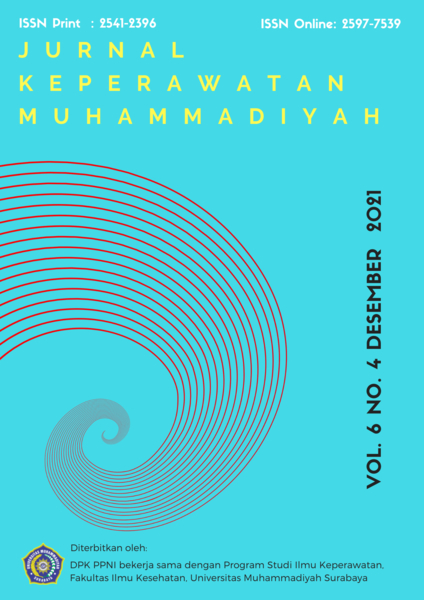Hubungan Peran Orang Tua Dengan Perilaku Merokok Pada Remaja Di Wilayah Kerja Puskesmas Galang
DOI:
https://doi.org/10.30651/jkm.v6i4.10392Kata Kunci:
The Role Of Parents, Smoking Behavior, TeenagerAbstrak
Adolescence is a period of growth and development of a person in achieving physical, mental, social, and emotional maturity. This period of self-discovery is not uncommon for teenagers to spend a lot of time outside with friends. This stage causes a lot of negative behavior that will appear, one of which is the behavior of adolescents in smoking. The incidence of smoking in adolescents aged 10 years and over every year continues to increase. The purpose of this study was to see the relationship between the role of parents and smoking behavior in adolescents in the work area of the Galang Health Center, Nguan Island, Batam. The research design is an analytical survey with a cross-sectional approach. The sampling technique used is total sampling. The results obtained 51.4% the role of parents is not good. Smoking behavior of adolescents 88.6% of adolescents smoke. A small proportion (14.3%) are teenage girls who also smoke. The results of the Chi-square test p = 0.029, there is a relationship between the role of parents and adolescent smoking behavior. It is recommended for parents to always pay more attention to children, especially when they are teenagers, provide a good example in the family environment and always provide education to teenagers, especially smoking is not only damaging to themselves but also to many people.Referensi
Albarsani, et al. (2019). Hubungan Antara Konformitas Teman Sebaya dengan Perilaku Merokok pada Remaja.
B.Hurlock, Elizabet.2014. Psikologi Perkembangan.Jakarta:PT Raja Grafindo Persada
BNN. 2015. Executive Summary Press Release Akhir Tahun 2015. Jakarta: Humas Badan Narkotika Nasional.
Dj, B. (2017, September 19). Gender Differences in the Transmission of Smoking From Filipino Parents to Their Offspring: The Role of Parenting, School Climate, and Negative Emotions. Substance use & misuse; Subst Use Misuse. https://doi.org/10.1080/10826084.2017.1284237
Depkes RI. 2012. Badan penelitian dan Pengembangan Kesehatan Kementrian Kesehatan RI. Jakarta
Faridah, Fathin. (2015). Analisis Faktor-Faktor Penyebab Perilaku Merokok Remaja di SMK “X†Surakarta. Jurnal Kesehatan Masyarakat, 3 (3), 890.
Isa, et al. (2017). Hubungn Tipe Kepribadian, Peran Orangtua dan Saudara, Peran Teman Sebaya, dan Peran Iklan Rokok Terhadap Perilaku Merokok Pada Siswa SMP Negeri 9 Kendari Tahun 2017. Jurnal Ilmiah Mahasiswa Kesehatan Masyarakat, 2 (7), 3-4.
King, L. A. (2013). Psikologi Umum: Sebuah Pandangan Apresiatif. Jakarta: Salemba Medika.
Martin,G,.& Pear,J.(2015).Modifikasi Perilaku.Yogyakarta : Pustaka Pelajar
Nurul Septiana, S. (2016). Faktor Keluarga Yang Mempengaruhi Perilaku Merokok Pada Siswa Sekolah Menengah Pertama. Jurnal Ilmu Keperawatan, 4(1), Article 1. http://www.jurnal.unsyiah.ac.id/JIK/article/view/6260
Pujiantoro & Mamik.(2013).Hubungan Peran Orang Tua Dengan Perilaku Merokok Pada Remaja Di Wilayah Kelurahan Mlilir Kecamatan Dolopo Kabupaten Madiun. Universitas Muhammadiyah Ponorogo. Jawa Timur.
Riskesda. 2018. Kementrian Kesehatan Republik Indonesia. Jakarta
Sitepoe,M.(2000).kekhususan rokok di Indonesia. Jakarta: PT Gramedia Widiasarana Indonesia
Septiana, et al. (2016). Faktor Keluarga Yang Memperngaruhi Perilaku Merokok Pada Siswa Sekolah Menengah Pertama. Jurnal Ilmu Keperawatan, 2-10.
Steinberg, Lawrence. 2002. Adolescence. Sixth edition, New York: McGraw Hill Inc
Suharyanta, D., Widiyaningsih, D., & Sugiono, S. (2018). Peran Orang Tua, Tenaga Kesehatan, Dan Teman Sebaya Terhadap Pencegahan Perilaku Merokok Remaja. Jurnal Manajemen Kesehatan Yayasan RS.Dr. Soetomo, 4(1), 8. https://doi.org/10.29241/jmk.v4i1.96.
Sugiyono. (2007). Metode Penelitian. PT. Gramedia.
Wade, C., & Tavris, C. (2007). Psikologi (Edisike-9). Jakarta: Erlangga
ŽaloudÃková, I., Hrubá, D., & Samara, I. (2012). Parental Education and Family Status—Association with Children’s Cigarette Smoking. Central European Journal of Public Health, 20(1), 38–44. https://doi.org/10.21101/cejph.a3652
Unduhan
Diterbitkan
Terbitan
Bagian
Lisensi
- Penulis tetap memegang hak atas karyanya dan memberikan hak publikasi pertama kepada jurnal ini yang secara simultan karya tersebut dilisensikan di bawah:Â Creative Commons Attribution-ShareAlike 4.0 International (CC BY-SA 4.0)









